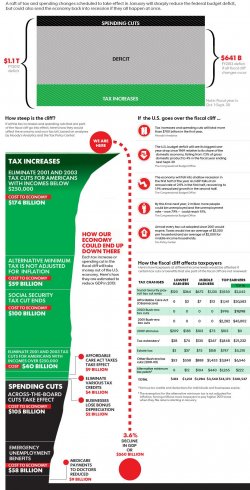Mad Scientist
Feels Good!
- Sep 15, 2008
- 24,196
- 5,431
- 270
From ZeroHedge:
Chart Of The Day: The Fiscal Cliff For The Rest Of Us | ZeroHedge
Tax Hikes: 388 Billion
Spending Cuts: 163 Billion
Unemployment could reach 9.1%!
Lol wut?
Chart Of The Day: The Fiscal Cliff For The Rest Of Us | ZeroHedge
You see the Tax Hikes compared to the Spending cuts?USA Today's great one-stop-shop infographic which simplifies the fiscal cliff impact for the rest of us: A raft of tax and spending changes scheduled to take effect in January will sharply reduce the federal budget deficit, but will also send the economy back into recession if they all happen at once.
Tax Hikes: 388 Billion
Spending Cuts: 163 Billion
Unemployment could reach 9.1%!
Lol wut?





